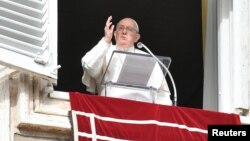Pope Francis has urged prayers for Nicaragua where two Catholic bishops,15 priests and two seminarians are in custody, with the most recent arrests taking place on Dec. 31. Observers fear the government of President Daniel Ortega is trying to eradicate the Catholic Church’s presence in Nicaragua.
The pontiff opened the new year with an appeal for prayer for the Central American country, expressing his deep concern for bishops and priests "deprived of their freedom" there and urging “the path of dialogue be always sought to overcome difficulties.”
“I follow with worry the events in Nicaragua, where priests and bishops have been deprived of their liberty,” he said. “I express closeness to families and the people, and I invite all of you of here present and all the people of God [to pray fervently], and hope for peace to overcome the difficulties. Let us pray for Nicaragua.”
Observers say the pope used his New Year’s Day address to shed light on the growing crackdown by Ortega’s government on the Catholic Church in Nicaragua, where clerics have been arrested, Catholic radio stations and a university have been shuttered, missionaries expelled, and religious festivities restrained.
Jason Poblete is a U.S.-based Catholic lawyer specializing in international religious freedom issues. He told VOA that there is no real functioning opposition in Nicaragua, a deeply Catholic country, and that has made the Catholic Church a target for Ortega’s government as international sanctions bite.
“The Catholic Church, it’s an easy target for Ortega,” Poblete said. “The priests, to their credit, they don’t want to be involved in politics. But they are being thrust into that because the people of Nicaragua are looking for leadership in Nicaragua. There is a civil society outside of Nicaragua, but they have no sway inside Nicaragua. Where do people go to next? The Catholic Church is still a force to be reckoned with.”
Observers point to the deterioration in relations between the Catholic Church and Ortega’s government during protests against social security reforms in 2018. Ortega accused Catholics of supporting the opposition during demonstrations, after the church sheltered protesters. Anyone seen as a government critic is severely repressed, analysts say.
International lawyer Poblete sees Ortega carrying out the left-wing Sandinista’s policies against the Catholic Church. In 1979, Ortega led the Sandinista revolution, which overthrew the dictatorship of Anastasio Somoza Debayle. But having lost elections in 1990, Ortega regained the presidency in 2007. Analysts, like Problete, say he has squelched any opposition.
“The Sandinista’s ultimate goal is to eradicate the Catholic Church,” he said. “This is their words. They don’t want the Catholic Church in Nicaragua.”
Martha Patricia Molina, a Nicaraguan lawyer and author of the study Nicaragua: A Persecuted Church? reports that the Ortega government has carried out more than 770 arrests, attacks, expropriations and harassments against the Catholic Church, including “impediments to processions, prayers, masses in cemeteries,” as well as spread hate messages, since 2018.




